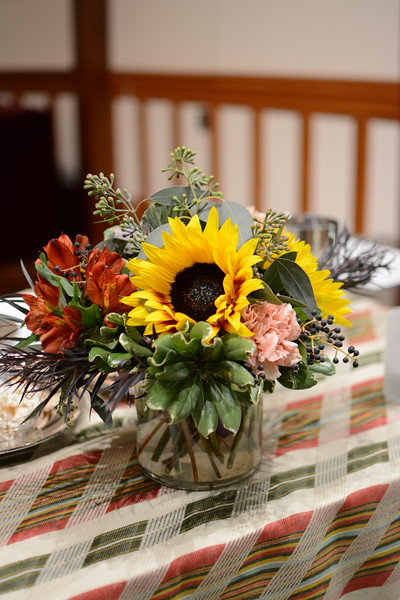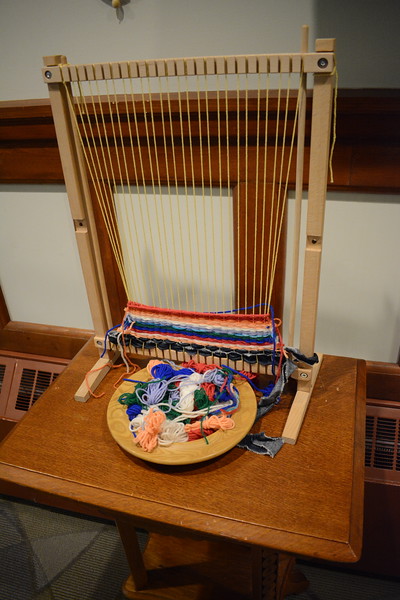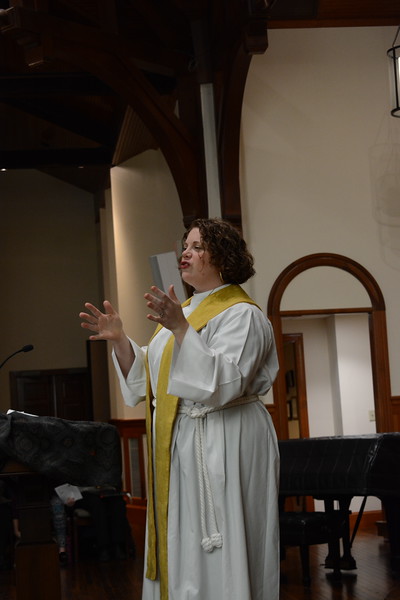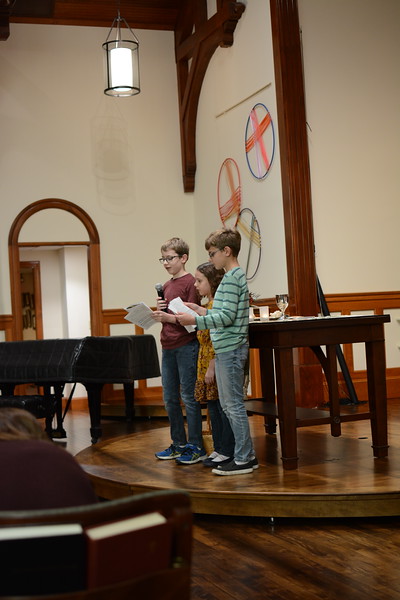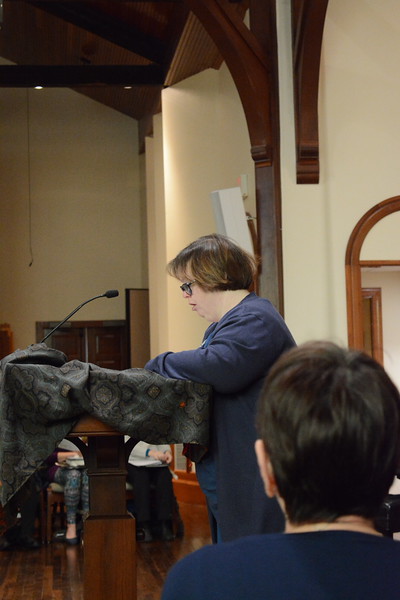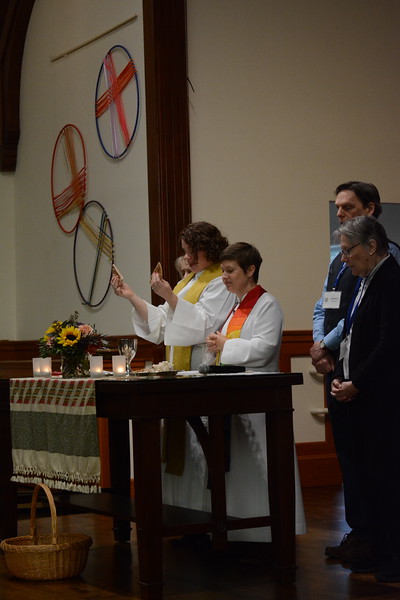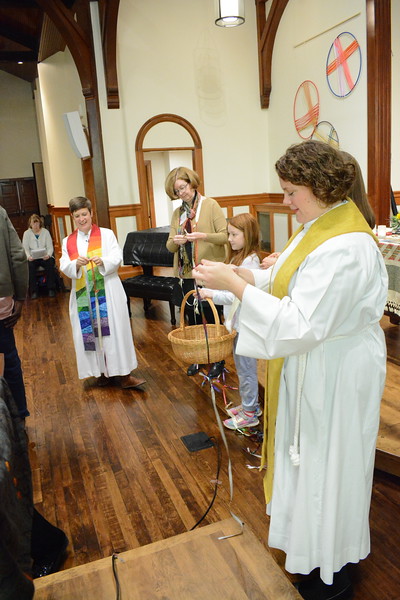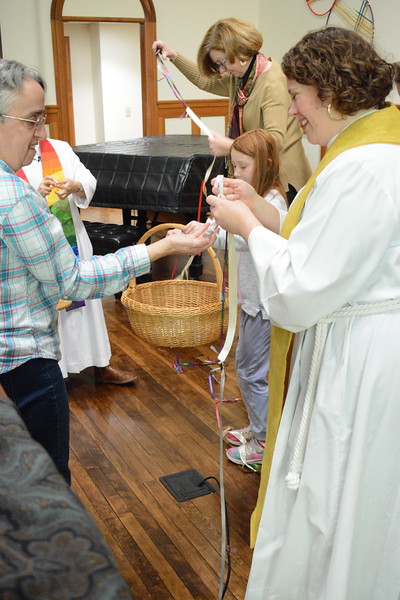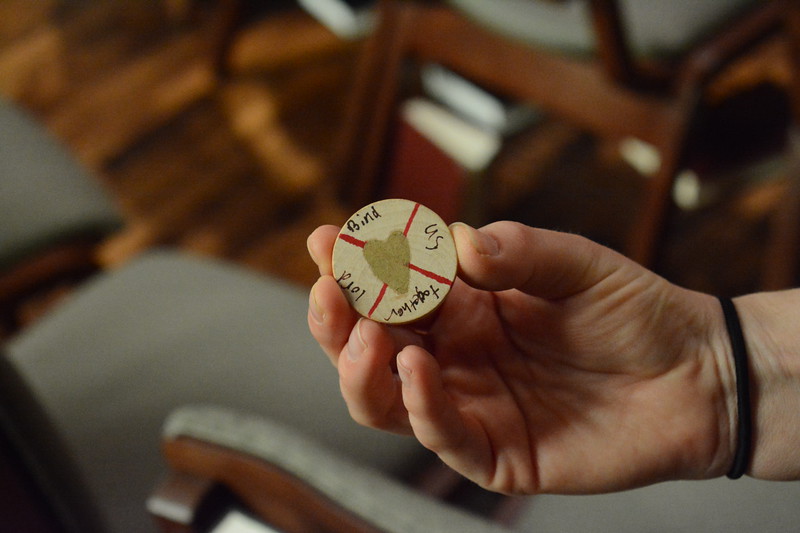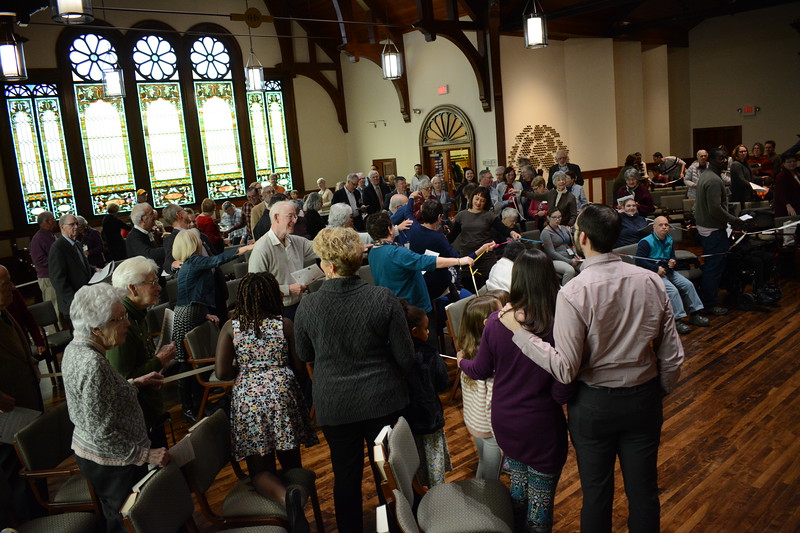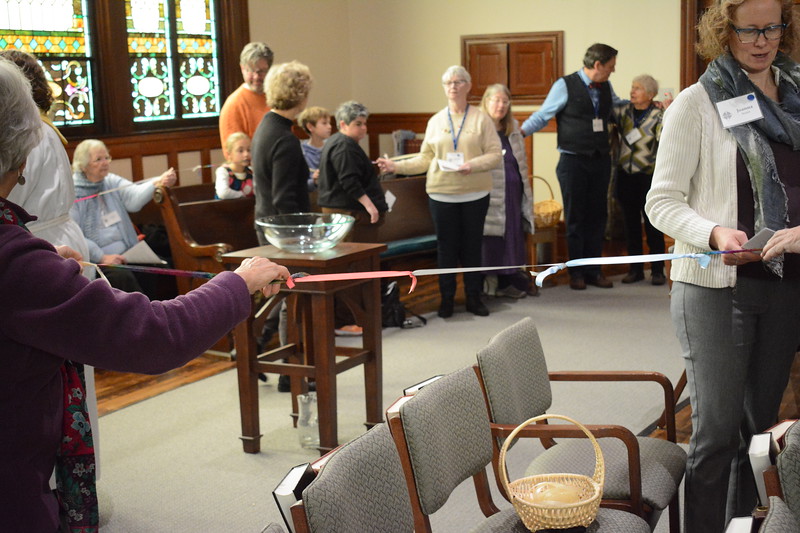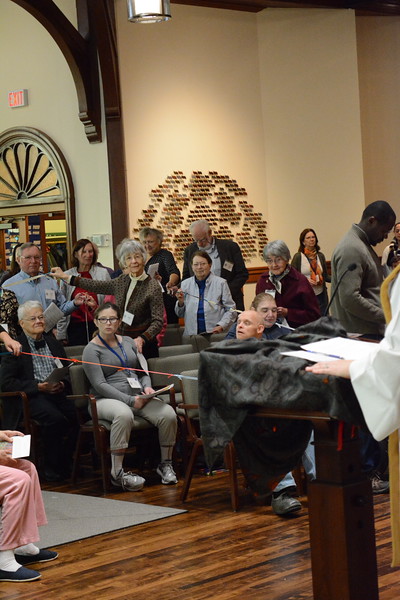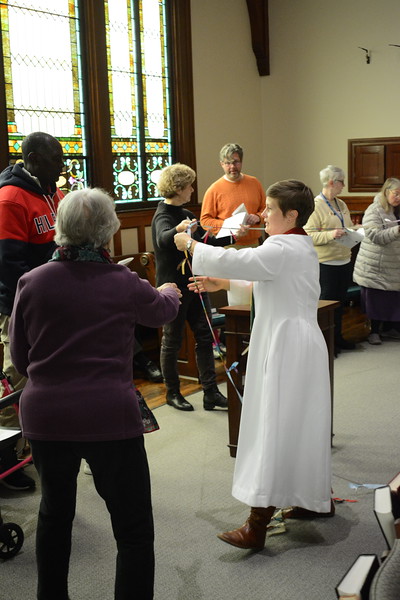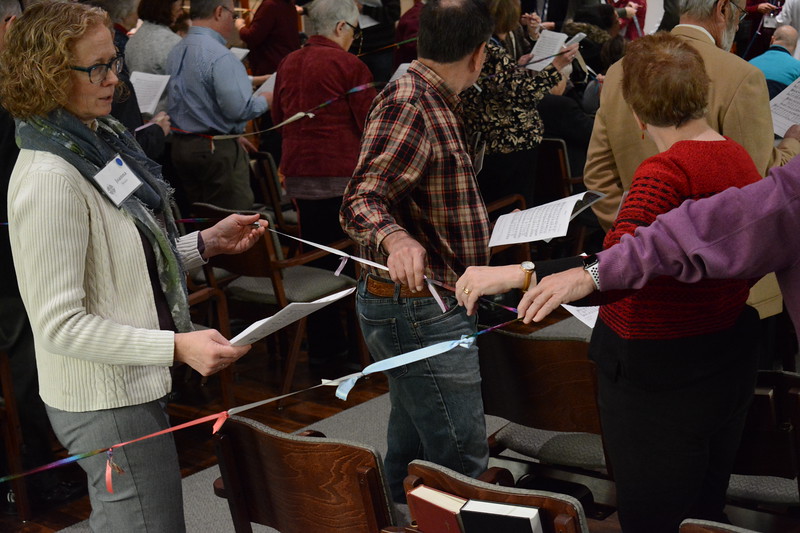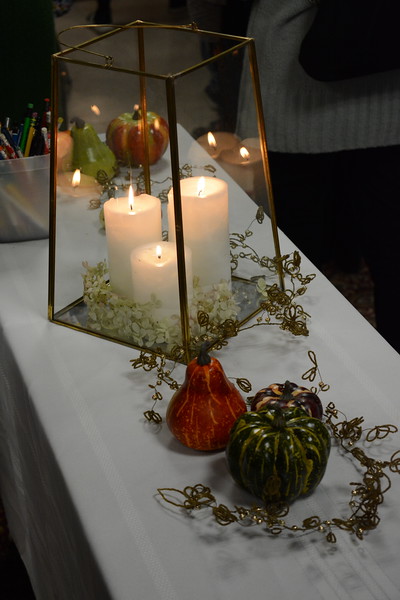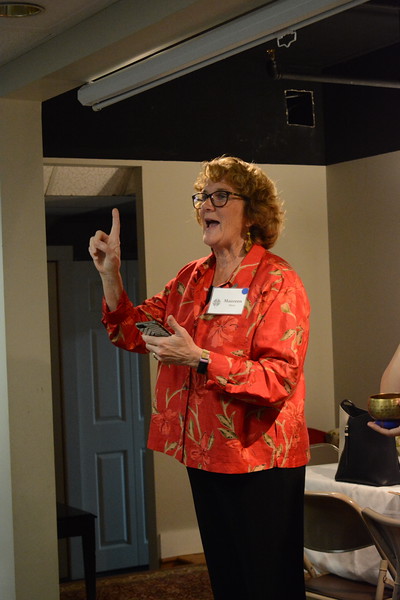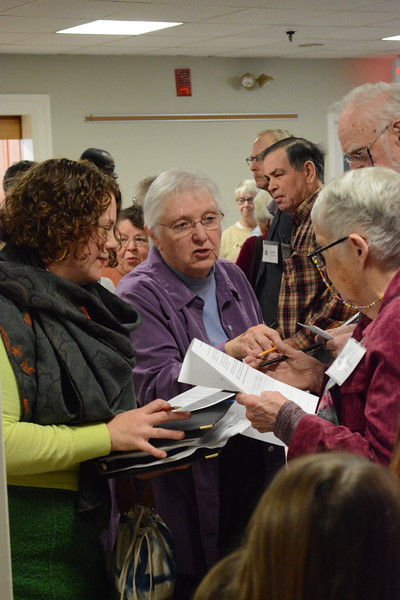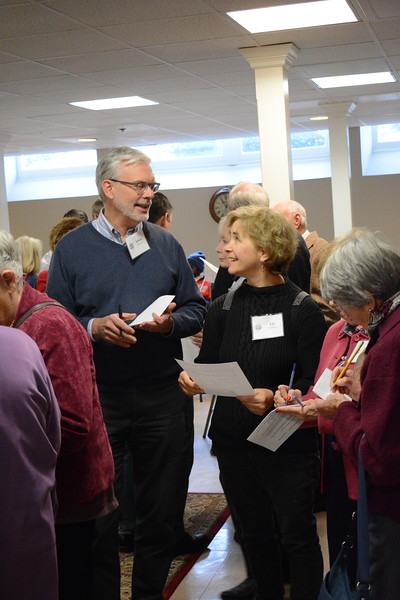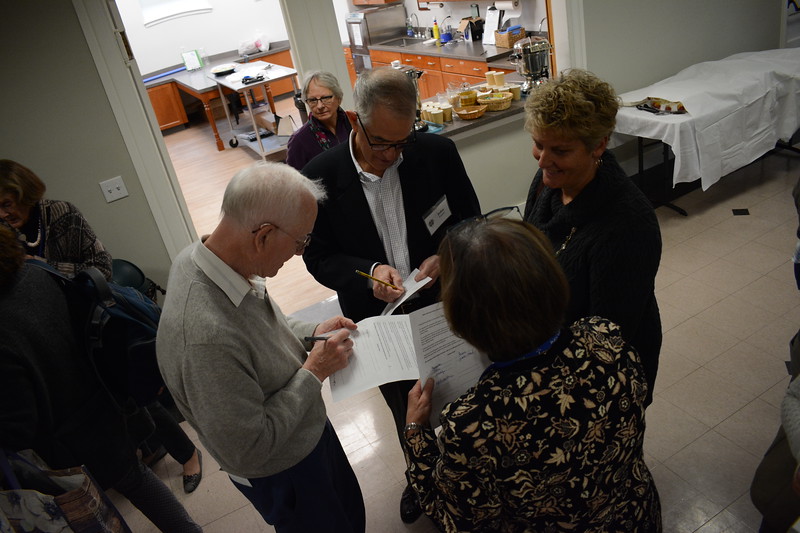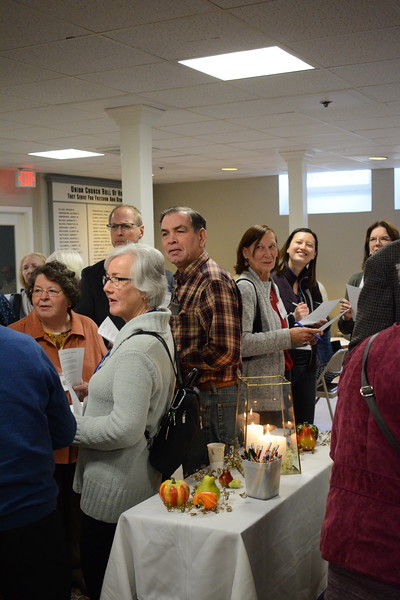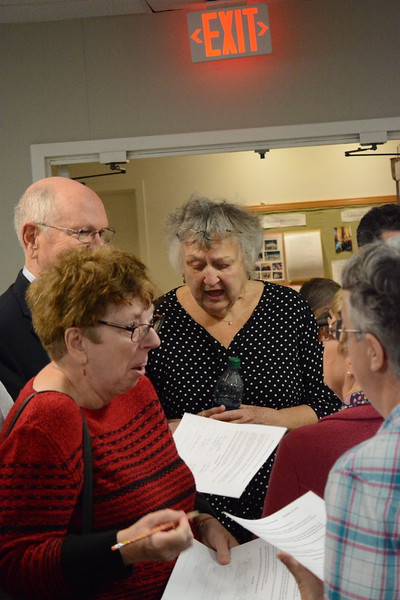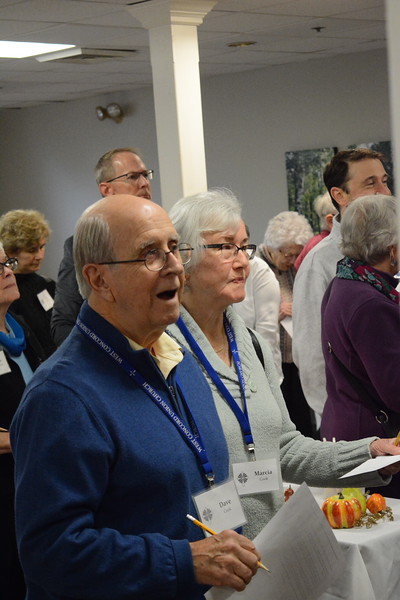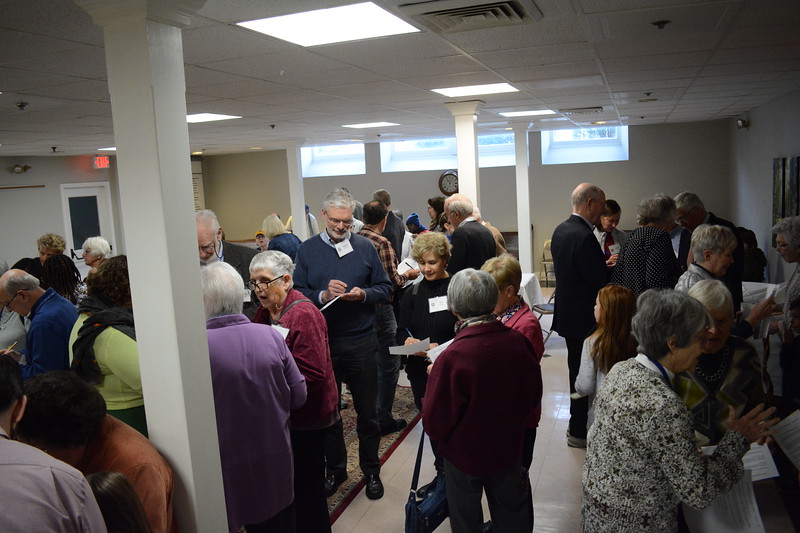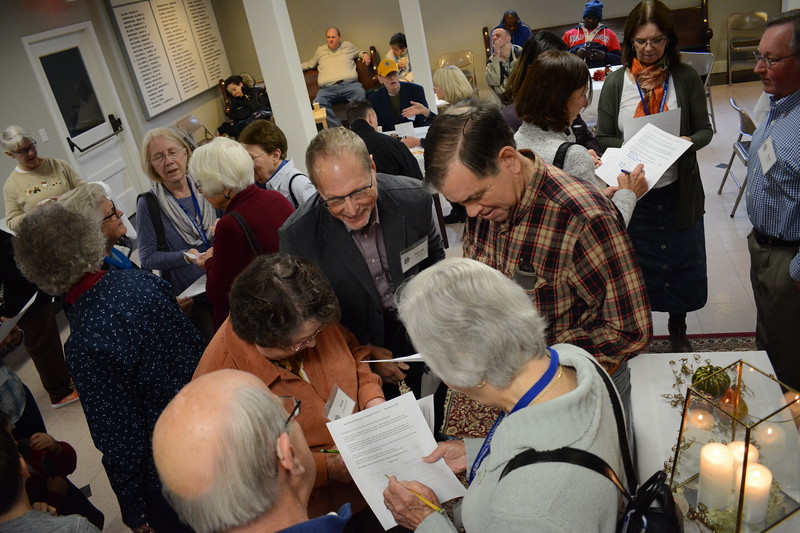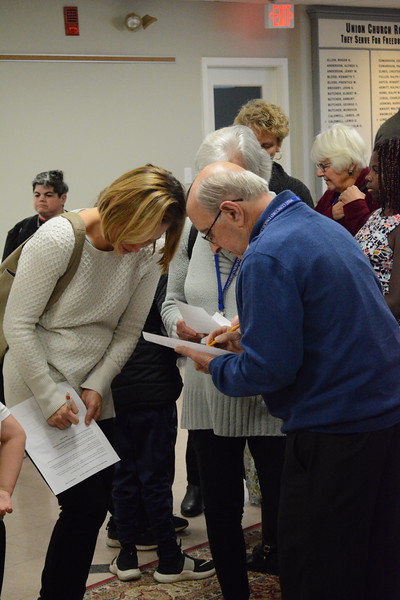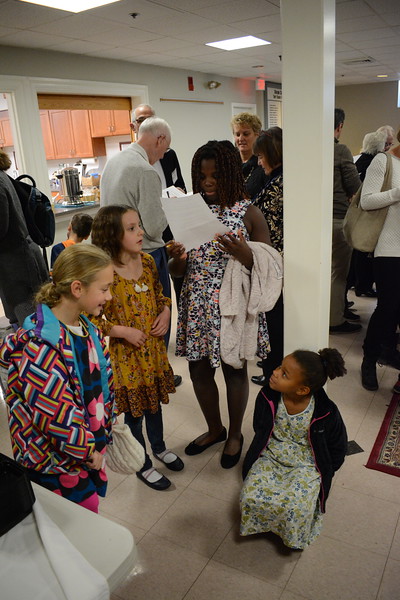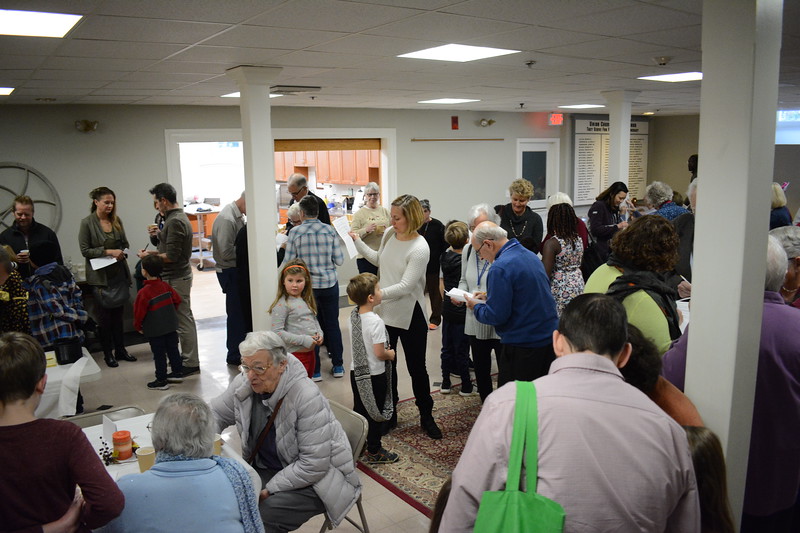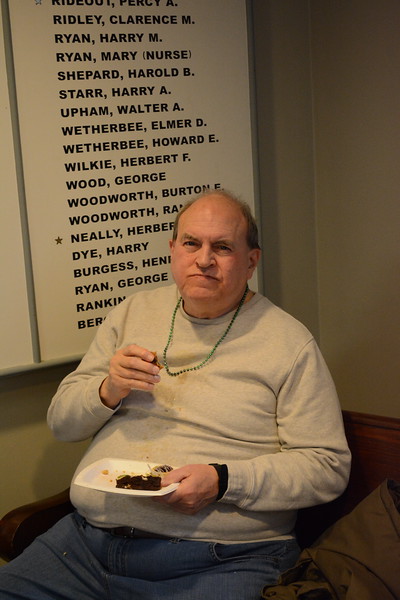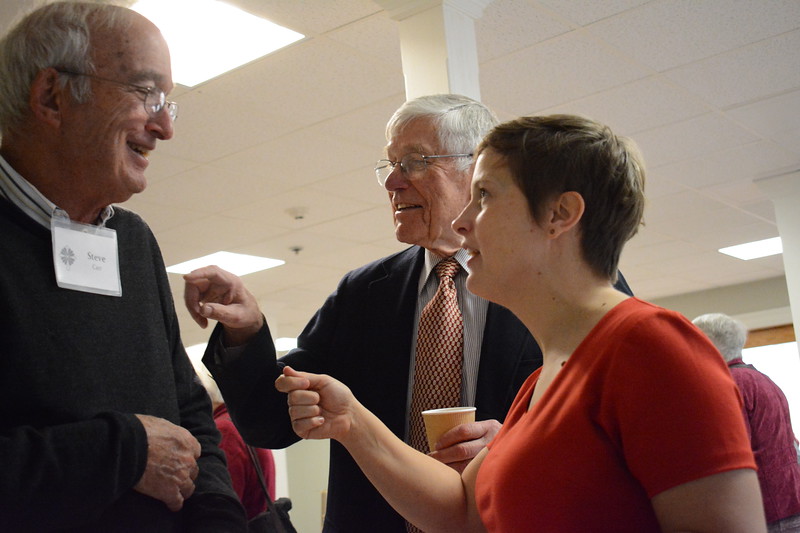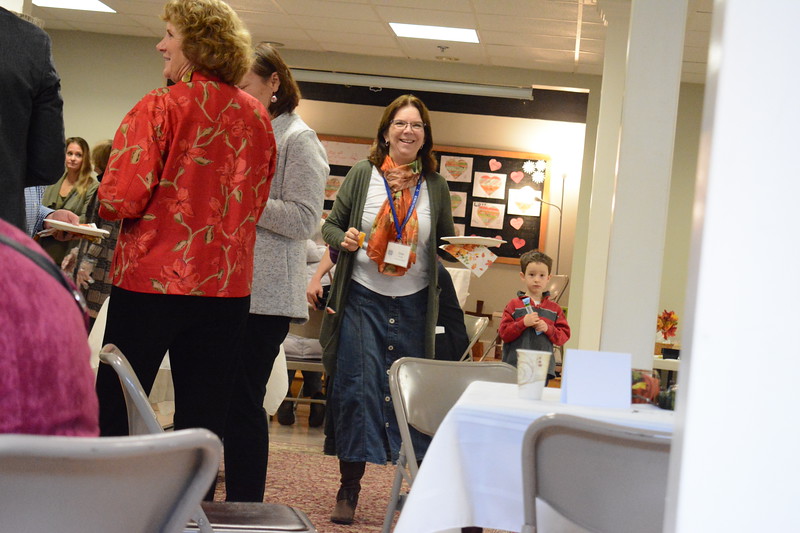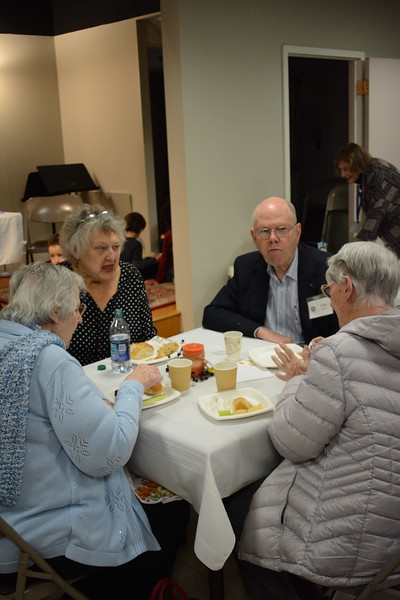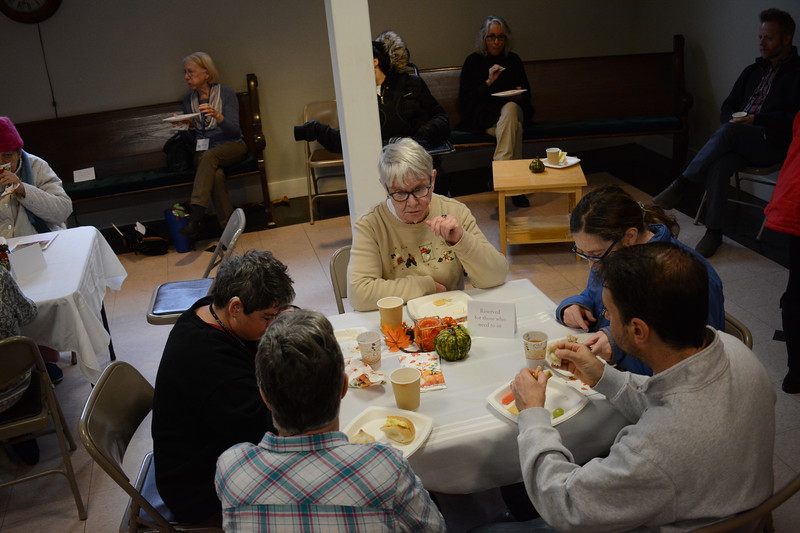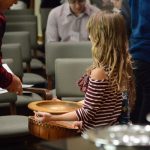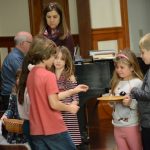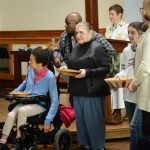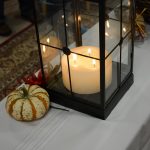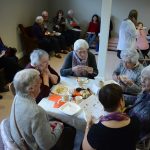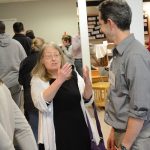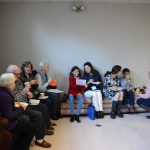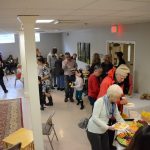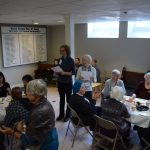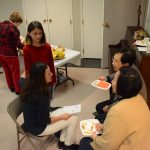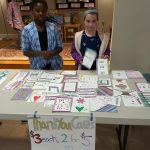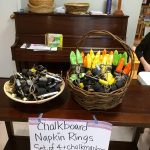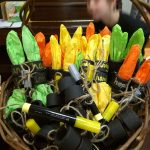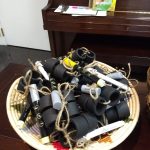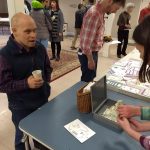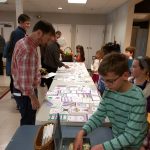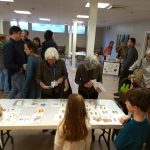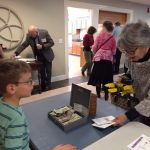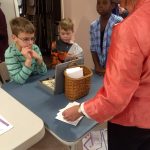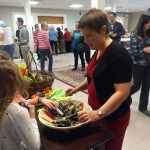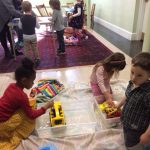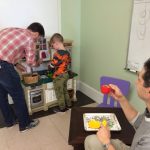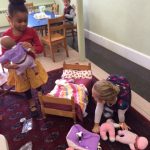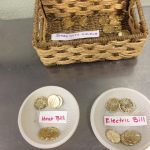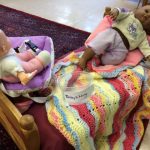Thank you for your presence, prayers, and labor to bring this service and fellowship together! It was a wonderful day!
Tagged with Congregational Giving
Worthy of Repair
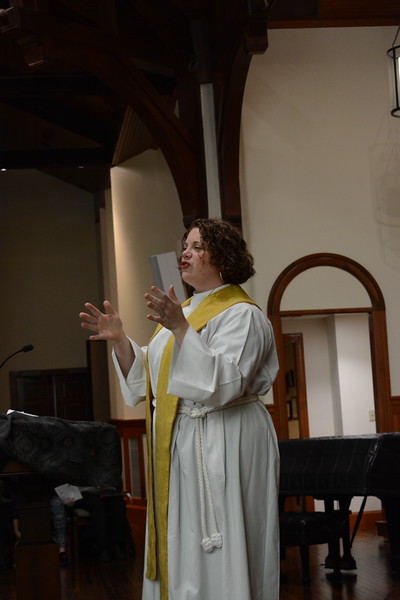
A guest sermon from the Rev. Laura Everett, Executive Director of the Massachusetts Council of Churches. Learn more about Rev. Everett’s mending work here.
Colossians 3:12-17
I bring you the blessings and greetings of the Massachusetts Council of Churches, a network of individuals, congregations and 18 denominations convinced that what binds us together in Jesus Christ is stronger than anything that might divided us. Anything that might divide us. Anything. We are bound together, knit together, sometimes patched and mended together. When so much threatens to tear apart the Church at the seams, the Massachusetts Council of Churches is in the business of repair.
Let us pray: Gracious God, I am bold to stand before your people and proclaim your good word. Send your Spirit among us that we might so we might receive the Word you have for our lives this day, in this place. I claim you again, my rock and my redeemer.
Did you ever feel the power of new clothes? A whole new world seemed possible with a first day of school outfit. My Girl Scout uniform proudly proclaimed with patches that I can tie knots and blaze trail. I think of the black suit jacket my mother bought for me at the store Express in the Rockaway Townsquare Mall in suburban NJ. The shoulders are too big, the fabric likely flammable, but somehow it felt possible that I could be someone different, someone professional, someone who could get a job.
For some of us who grew up poor, new clothes mostly just mean new to us. Those new clothes had been broken in by others, older siblings handing down, or strangers who left behind a butterscotch candy and a crumpled tissue in the pocket by the time we found their old coat at Goodwill.
New clothing, wherever it comes from, signals a change: the white cotton of a baptismal gown, the pale blue silk tie of a wedding day. New clothes for a job interview, a sports jersey, a work uniform, dress military uniform, a jail uniform, a hospital gown, a burial shroud. Often, something big has changed, more than just our exterior when we put on new clothes.
St. Paul turns to this idea of clothing to explain how the Christian community should act. He writes “As God’s chosen ones, holy and beloved, clothe yourselves with compassion, kindness, humility, meekness, and patience.” What I love about this metaphor is the ability to become something new. Put it on. Try on something different. Right before this passage, St. Paul tells the Church in Colossae (koh-LA-see) to “strip off the old self” of its practices of malice, slander and wrath, and to clothe yourself in the new image of your Creator. This is a powerful idea- we can behave differently. Take off your anger choking at your neck like a collar that’s buttoned too tight. Instead, put on the soft, handmade, well-fitting sweater of love.
Clothing would have functioned very differently in the ancient world of this text. People would have had only a few items of clothing- a tunic, a cloak, a belt, sandals. Clothing was precious, which is why the soldiers cast lots for Jesus cloak. When Jesus tells the disciples to “take nothing for the journey,” not even a second tunic or pair of sandals, rest assured these disciples did not have a closet full of extra tunics. When the woman reached out to touch the hem of Jesus’s cloak, she likely felt wool or linen. Clothing was homegrown, homespun, home woven, hand dyed and hand sewn. And so, Paul’s command to take off the garments of your former self and clothe yourself anew is an invitation to major change of that one garment you’ve been wearing all the time. Beloved, if there’s an ill fitting garment you’ve been wearing for too long, you do not have to wear it any more.
To this Christian community in Colossae, Paul is pointing to a new way to be in the world. The thing about clothing is that it’s visible. These are not private virtues, but visible to the world. When we are clothed with compassion, kindness, humility, meekness, and patience, others will see it. They will know we are Christians by our clothes. In a way, yes. This is the promise of the Christian life, in our baptismal gowns, we are all clothed in a new garment. We can wear our love like heaven. We can be different than what we’ve been. We can clothe ourselves in love.
A 19th C Baptist minister in Manchester, England wrote, “It takes a lifetime to fathom Jesus; it takes a lifetime to appropriate Jesus; it takes a lifetime to be clothed with Jesus. And the question comes to each of us… Are we daily, as sure as we put on our clothes in the morning, putting on Christ the Lord?” (Wearing God, p40)
And yet, and yet, even as Paul tells the Church to clothe ourselves in love, even as we’re asked if we’re putting on Christ as we put on our clothes each morning, we know that some of us are not able to dress ourselves. Some hands can’t manipulate fiddly buttons. Some eyes can’t see the tiny clasps. Young and old and everything in between, we rely on others to assist in clothing us, to get to that zipper all the way in the back. And much of what has been draped on our bodies are not the garments of heaven but things that constrain, cover, denigrate and deny.
The writer Lauren Winner puts it this way: “On Paul’s terms, Jesus is not the kind of clothing that creates social divisions, but the kind of clothing that undoes them. Jesus is not a Vineyard Vines dress or a Barbour jacket; He is the school uniform that erases boundaries between people.” (Wearing God, pg 50)
When it’s at its best, Church is where we clothe one another in love. Here is where we put on Christ, together. When we’re tangled up in that sweater that’s too small, when we’re drowning in that suit jacket that’s too big, we come here and get right-sized. We come to Church together so that sometimes, someone else can remind us that however banged up and scuffed up and torn up we feel, we are clothed in Christ. Every Sunday we can come in frayed, and aim to leave wrapped in the garments of God.
And this is why you are giving generously to this church. West Concord Union Church has a beautiful reputation of being a place where everyone, regardless of ability, is clothed in love. We give because we believe in this work and witness. To the Church, Paul writes “clothe yourselves with love, which binds everything together in perfect harmony.” When we’re all clothed in love, we are bound together.
I see how you’ve been weaving in this season. Over the past 5 years, I’ve been learning how to mend textiles. I’m trying to learn with my hands what I long for in my life and in the church: repair. Because so much is broken, and the threads of community and country feel like they are coming apart.
Well- loved clothes wear out. The things we wear all the time become threadbare. Seams start to fray. Moths break in. Places of regular use and friction need reinforcement.
And this is what I’ve come to know, Church: mending is an affirmation. We do not mend what we do not value. We repair what we cherish, what we love, what is precious in our sight. When I patch the hole in my wife’s pants, I’m showing my care for the garment and the one who is clothed by it.

This has become one of my most prized possessions- a wool scarf I’ve been mending for years. All those orange bits are darned with wool. With every stitch, ever act of repair, it becomes more valuable to me, not less. This is what your giving to Church does, you mend. Your repair what you love.
The longer I’ve sat in on my couch with a darning egg and some orange wool and my scarf in my hands, the longer I know this to be true: This is our God, the repairer, the healer, the mender.
God longs for our healing, in our messy, human bodies and in our messy, human community. God longs for us to be clothed in beauty, in compassion, in tenderness and glory. God is a mender.
Maybe it is like this: Maybe God makes a cup of tea and tucks a quilt around. Maybe, God takes our brokenness in her hands and slowly stitches us back together. Attentive, precise, tender. God takes what the world considers disposable and mends so that we might clothe ourselves, clothe one in love, be clothed in Christ.
Mending is an act of devotion, and affirmation of worth. And you, beloved kin of Christ, are worthy of repair. Clothe yourselves in love.
Money Problems
Luke 18:9-14
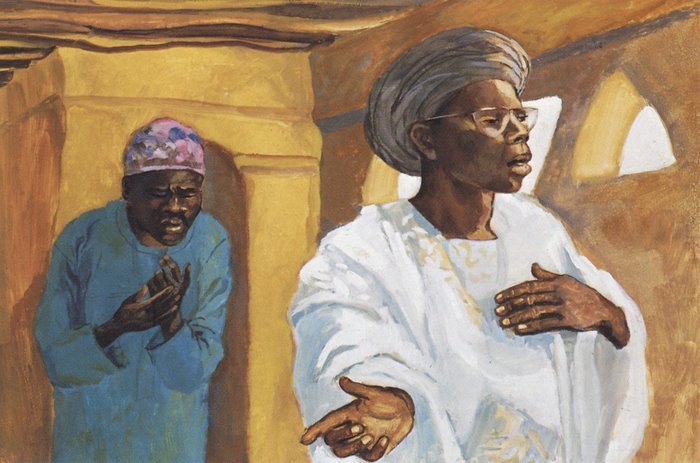
The love of money is the root of all kinds of evil, according to our scriptures (1 Timothy 6:10). I wonder if you can remember a time when money has been the cause of evil in your life: when money has caused a problem for you.
There are so many different kinds of money problems. There are personal money problems; we may experience a conflict between our income and our needs, or our income and our wants. There are relational money problems; differing amounts of money, differing approaches to money can cause tension with family and friends. Money can divide us politically, as we argue about how it should be taxed and spent by our government. Our wealth also divides us socially, and is used to reinforce racial divisions, granting or denying us access to neighborhoods, to schools, to careers. And there’s at least one other sort of money problem. According to Jesus, money can cause problems in our relationship with God.
In the parable Jesus tells today, two people go up to the Temple in Jerusalem to pray. Both are at odds with God because of money. One is a tax collector, a collaborator with the Roman Government. Like Zachhaeus, whose story we heard last week, this person has taken advantage of others, charging them more than what is owed. Through avarice and greed, this person has divided themselves from both God and neighbor.
The other person is a Pharisee, someone who carefully follows the guidance of Torah. This one observes righteous practices, such as fasting and giving away a tenth of their income. Knowing this, we might assume that they are at peace with God and beloved in their community. However, the scripture story is quick to destroy that idea. Apparently this person stands apart from everyone else, and prays what can only be called an obnoxious prayer: “God, I thank you that I am not like other people!” For this person, generosity has led to self-satisfaction and contempt for others. They are also divided from both God and neighbor.
Every year in this season we reflect on issues of money. In part, that’s because we ask you to consider making a giving commitment to the church. But that’s not the whole story. Jesus talks about money all the time – more than just about anything else. According to Jesus, money is one of the biggest barriers that we face when trying to get close to God. We have to talk about money in church, if we’re going to be faithful to the teachings of Jesus.
Everyone’s relationship with money is different, depending on our background, our experiences, and our current bank balance. But most of us struggle somehow in this area. We are plagued by pride or shame, privilege or want, jealousy, or some confusing combination of these feelings. Few of us may have reached the extremes of greed or self-satisfaction illustrated by Jesus’ parable. Still, we may find ourselves fairly mixed-up about what a faithful way might be to spend, to save, and to share what we have.
I must confess to you that this is something I continue to struggle with. Living in Concord, I am oddly aware of all the things that my family doesn’t have: fancy vacations; unlimited extracurricular activities, high fashion, club memberships, constantly new electronics. This environment encourages me to view my own means as quite moderate. It teaches me to protect my income for the use of myself, my children, my retirement. On the other hand, I have only to pay closer attention to the world around me, even right here in this geographic area, to remember that my family’s means are not only sufficient, but extravagant. Just the fact that we don’t need to worry about money (as long as we plan a little) is an extraordinary privilege. Add to that a beautiful neighborhood, an extraordinary school system, the ability to afford daycare, access to good produce; connection to the arts… I could go on and on.
For many years now I have shared my own giving habits with you. I am fortunate to be able to continue dedicating ten percent of my income towards this church. It has become a habit, something that our family’s finances are structured around. Some of you have heard the story of how this happened: how my spouse’s giving spurred me on to greater generosity. I admit to still struggling over how to prioritize my other giving: how much it should be, and where it should it go. Pray for me, as we make the transition out of daycare bills this year, as I continue to discern how God is calling us to be stewards of what comes into our hands.
No matter where we are on the spectrum of wealth, and no matter where we are in our practice of generosity towards others, our practices about money belong in our prayer life. There are so many conflicting messages within and around us concerning money, that only with God’s help can we make some peace in our divided hearts.
But once we open ourselves to God’s help, then the Spirit really starts to move. For the amazing thing about money is that it not only causes problems and divides us from one another; it can connect us, too. Think of what money makes possible, when it is used for good. Money can buy food and fuel social transformation. Money can support the arts and make reparations for injustice. Money can connect us to people right next door or around the world in common cause. And when we give with peaceful and humble hearts, money can also connect us with God, who fills us with power and purpose and joy.
And I have to say: it is a joy for me to use the money that has come into my care to help fuel this congregation, and to witness you doing the same. To hear the stories of those who need this place, and whose lives have changed because of their encounters here with God and with all of you, because of your generosity. In music, care, service, prayer, personal growth, deep sharing: this community binds up hearts, and reaches out to facilitate connections far beyond our walls.
Beloved, how is your relationship with money, right now? Is it a source of stress, or pride, or shame, or all of the above, or something else entirely? How do the ways that you use your money separate you from and connect you with God and your neighbor? Jesus invites us to pray on these things with humility; to seek ever greater alignment of our conscience and our practice, for our own sake, and for the sake of others.
Those two people in the parable came to the temple with their money problems; and we come here, to church; because at least some part of us longs to worship God, instead of wealth. The good news is that God offers abundant grace to all of us: the penniless, and the over-privileged; the generous, and the grudging; the self-satisfied, and those who are ashamed. God offers us grace, and invites us to try again, and again. Each day the next breath, the next choice, a bit more freedom, peace, and gratitude. May it be so for each of us. Amen.
A Special Thank You
Bring Forth: Celebration
Thank you to everyone who worshiped, gave, decorated, cooked, served, ate, played, and more to make Sunday morning a wonderful celebration.
- Some angels brought gifts
Sowing Seeds
Isaiah 45:8
Matthew 13:1-9, 31-32
When I was growing up, my family planted morning glory seeds every year along the side of our house: long, green, curly vines, with brilliant blue flowers that open up in the morning. Our morning glories at Newhall Drive in Whitefish Bay Wisconsin grew up happily, twisting around a trellis. Every morning I would go out to check on them, to see how much higher they had grown and to count how many flowers they had.
It’s a sweet memory. So, I decided that I should plant some morning glory seeds for my kids. I can’t say I have a very green thumb, but watching my mother garden for so many years, I know the basics. So I went out to Verrill farm and found some morning glory seeds. Right next to the morning glory seeds at the store were some evening glory seeds, moonflower seeds that bloom at the end of the day. So, I bought some of those too.
I felt really good about my parenting that day. I was not only maintaining a family tradition, I was expanding it! Flowers to count in the morning, and also at night. Vines growing all around the house. Then the seeds just sat there, in their pretty paper packets, on my counter, for a year. A whole year passed without my managing to get any of those seeds into the ground.
Last spring I was determined to do better. My kids were out of diapers! I was ready to conquer the world, or at least, a little gardening. I even looked up the right date to plant the seeds, and put a notification on my electronic calendar. When the date came, and the notification popped up, I went outside with my trowel and spade and seeds and my kids, and we planted those seeds in the best spots I could find. We watered. And we waited. And we waited. And we watered. Nothing seemed to be happening.
You never know what’s going to happen with seeds. Surely the crowds who surrounded Jesus knew that, even better than we do, as they lived closer to the earth. Jesus says to these folks: “Listen! A sower went out to sow. And as he sowed, some seeds fell on the path, and the birds came and ate them up. Other seeds fell on rocky ground … and they sprang up quickly… But when the sun rose … they withered away. Other seeds fell among thorns, and the thorns grew up and choked them. Other seeds fell on good soil and brought forth grain, some a hundred fold, some sixty, some thirty. Let anyone who can hear, listen!
I wonder about the skill of this particular sower. Why sow seeds on a path? Why sow seeds among rocks, or thorns? Why wouldn’t a sower be more careful with her precious seeds, directing them towards only the best soil?
But of course, this is a parable. Jesus even goes on to explain it later on in this chapter. In this parable, Jesus tells us, the seed is the word of the kingdom, the good news of God. This good news is scattered widely among all people, but it does not always grow. Sometimes the seed is stolen from a heart by evil. Sometimes it wilts in the heart, as the result of trouble. Sometimes it its growth is choked in the heart by the cares of the world or the lure of wealth. There are many ways for seeds of the word of the kingdom to die. Still, sometimes, the word reaches a heart that is open and ready, good soil, with good conditions for growth. Someone hears the word and trusts it until it roots down deep within them, bearing fruit and yielding thirty, sixty, or a hundredfold.
I’ve been thinking this week about the seeds that this community scatters. Seeds of the good news, seeds of God’s kingdom. We scatter words of encouragement and wisdom, acts of kindness and service, gifts of presence and prayer, witnesses of justice and love. Our sowing does not always go perfectly. We may occasionally set ourselves too ambitious a planting schedule. We may not always have enough sowers at the right time, in the right place. And many of the seeds we sow, we never know if they grow.
This is simply the way of sowing, Jesus tells us. It’s an act of generosity, with an uncertain outcome. And yet, with all the seeds that die or get drawn away by the wind, some seeds take: and what a magnificent harvest they make.
A magnificent harvest. When someone is comforted by the visits and cards they receive at a difficult time. When young people are empowered to serve, and given a chance to lead. When weary hearts are encouraged with music and prayer, beauty and hope. When our capacity to welcome one another, and to accept ourselves, keeps growing. When our relationships with other faith communities are strengthened. When those who are lonely find companionship. When new people arrive and discover a place that will support and enrich them.
The sowing that we do together is sometimes difficult, but the harvest is enough to take the breath away. God multiplies our efforts, sometimes by thirty, or sixty, or a hundredfold. Like a mustard plant, seeds of God’s good news sometimes find such good soil that they grow and spread like weeds: enormous, persistent, sprouting up everywhere.
As it turns out, the seeds my family planted did not grow very well. The moonflower seeds never even sprouted. The morning glory seeds did sprout, but they never creeped upwards or made flowers.
I’ll plant some seeds again this spring. There’s one thing we can be sure of: without seeds, nothing will grow. I am grateful to be sowing seeds of the kingdom with all of you. And I am grateful for all of the sprouting, and growing, and climbing, and bursting into flower that we get to witness together.
God our Gardener, we give thanks for all that you do. You prepare the soil of our hearts, breaking down rocks, tearing out weeds, sending water and grace. You scatter seeds of good news relentlessly among us, even when we are not ready for them, just in case a root, a sprout, a leaf might grow. You empower us to stretch and bloom, until we can be sowers and seeds ourselves, partners in the work of cultivating your kingdom on earth. Bless us to be a blessing, now and always. Amen.
A Wonderful Sale!
Check out the fabulous pictures from our FANTASTIC greeting card and chalkboard napkin ring sale, sponsored by Children’s Ministries and Sunday Fellowship! Last Sunday was a wonderful success, and we thank all who participated and supported our ministries and our lessons about Congregational Giving. The proceeds from the sale will be divided between Children’s Ministries and Sunday Fellowship and offered as our pledges for 2019. Stay tuned for the sale totals!
Earning, Spending, and Giving Away
As our preschool and kindergarten children continue to learn about Congregational Giving at WCUC, last Sunday they had a hands-on lesson on managing money. Assisted by several older Middler helpers, stations were set up around the classroom that either cost money or earned money by participating. Washing a truck earned one coin, babysitting earned another one. Serving food at the restaurant earned a coin, but buying food cost one. The children even had to purchase their snacks for two coins each! Sometimes the lights would go out and a coin would be paid for the electric bill. The heat bill was paid too. And all children were invited to share a coin that they earned back with the church. It was a fun and dynamic lesson about earning, spending and giving away money – just as Jesus taught us!
- Paying for snack!
- Signing a special card for a wounded veteran earned a coin too
- Washing trucks earned one coin
- Working at the restaurant earned one coin. Buying food cost another one.
- Babysitting! Hard work earned a coin
- Don’t forget to pay the electric and heat bills! And remember to give a coin to the church.
Unlimited
I Kings 17:8-16
In the book of Kings we learn about the leaders of the Kingdom of Israel. The book begins with stories about the great Kings, David and his son Solomon. It continues with many lesser rulers of a divided kingdom, each seemingly worse than the last. Jeroboam and Reheboam, Abijam and Asa, Nadab and Baasha; Elah and Zimri and Omri; almost all of them regularly do what is evil in the sight of God. But perhaps the worst of all is King Ahab. It is during the reign of this awful Ahab that we meet Elijah: one of the greatest prophets of all time.
Just before our text today begins, the word of God comes to Elijah, predicting a drought. God tells Elijah to go east, and hide himself by the Wadi Cherith. Elijah survives by drinking from the wadi and eating bread and meat delivered by ravens, according to the command of God.
Unfortunately, in time, the wadi dries up. Elijah is no longer provided for. God gives Elijah new instructions: “Go now to Zarephath, which belongs to Sidon, and live there; for I have commanded a widow there to feed you.” Elijah goes to Zarephath and asks a widow for water and food. The woman replies, “I have only a handful of meal in a jar, and a little oil in a jug; I am now gathering a couple of sticks, so that I may go home and prepare it for myself and my son, that we may eat it, and die.”
Elijah is not daunted by the woman’s reply. He says, “Do not be afraid; but prepare some of your food for me, and afterwards make something for yourself and your son. For God says: The jar of meal will not be emptied, and the jug of oil will not fail until the day that the Lord sends rain on the earth.” The woman agrees to do what Elijah asks. And amazingly, she discovers that Elijah is right: her jar and her jug do not fail: her household is well fed.
Recently, I had the opportunity to spend several days with a bunch of church people at a continuing education course on fundraising. We wrestled with big questions about money and faith. We considered new ways to invite people to use their financial resources to support the missions of our organizations. I left totally excited about the role of generosity in our faith lives, and the opportunities we have here at this church to deepen our shared commitments.
It is clear from this passage in the book of Kings that Elijah did not have the opportunity to attend this particular fundraising course. He’s asking for food, instead of money, but it comes down to the same thing. Elijah does just about everything wrong, from a fundraising perspective. He doesn’t get to know the woman at all before inviting her to give. He doesn’t explain what his mission is, why he might be a worthy investment. He doesn’t even truly ask for anything: he just demands what he wants. Worst of all, Elijah doesn’t take no for an answer. When this woman explains that she and her family are literally starving, he still pursues his object aggressively, demanding that she feed him before her own child, and promising that God will not allow her food to run out.
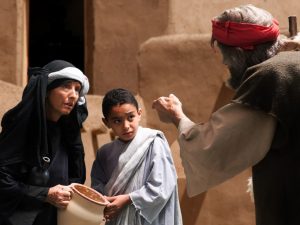 I love the look on the child’s face in the picture of this story. His face says it all. You’re asking us for what? You’re promising us what? I’ve seen that look before. I’ve felt it, on my own face.
I love the look on the child’s face in the picture of this story. His face says it all. You’re asking us for what? You’re promising us what? I’ve seen that look before. I’ve felt it, on my own face.
Strangely, this story ends well. The widow decides to feed Elijah. Meal and oil magically multiply in their containers to satisfy her whole household until the drought is over. What on earth are we supposed to learn from this?
Most of us have a complicated relationship with money, with resources. This relationship is shaped by our history of having too little, or just enough, or more than enough. It’s shaped by the attitudes of our family members and friends, and any faith communities and cultures we have been a part of. Sometimes folks talk about having “common sense” when it comes to money, but in my experience, people have very different ideas about what that common sense should be. There are several radically different philosophies about money floating around in our culture. For example: our American commercial culture tells us to take as much as we can get, and buy the most expensive things we can possibly afford. Commercial culture promises that money can give us pleasure, even happiness, while demonstrating to others how valuable we are. Alternatively, many of us here in New England have been taught to be very cautious with our money. Don’t show what you have; don’t talk about what you have; don’t spend more than you have; make sure you can be responsible for yourself. This Puritan-inspired attitude promises that our money management will prove our morality, preserve our pride, and keep us secure.
Most of us are already confused about money when Jesus comes to crash this party with an entirely different point of view. Jesus tells us that we cannot serve two masters – God and money. Jesus tells a rich young man: “Sell everything you have a give the money to the poor.” Jesus tells us to consider the lilies; not to worry about our basic needs. Nothing that Jesus says could be considered common sense. If we follow Jesus, he won’t make us rich OR responsible. Instead, he tells us something that belies most of our experience. Jesus, and our wider scriptural tradition, tell us: It’s not about the money.
It’s not about the money. How can that be true? Money is great, and helpful, and often necessary. It’s one thing to hear that it’s not about the money in Concord, Massachusetts, where most of us are not planning to lay down and die after our next meal. It’s quite another thing for the widow in our story today. Surely it is about money, about resources, for her.
I struggle with why so many scripture stories lift up the generosity of those in true poverty. I don’t want to romanticize poverty, or spiritualize it. Want is real, and it can be brutal. I do wonder, though, if our ancestors realized what modern research teaches us: it is those with the most limited funds who are statistically the most likely to share them. Those who have the most limited resources are the most likely to be our leaders in generosity.
Why is this? Why are those with the most limited resources the most generous? I wonder if struggling with a lack of money reveals money’s limitations more starkly. Money can do a lot; but in the end, it fails to bring lasting pleasure, true happiness, moral superiority, individual independence, or security. When money is not available, when there is not enough, the truly valuable things are perhaps more obvious: relationship, compassion, community, faith. Money is a means, but not an end. If we make it our end, we are doomed to profound disappointment.
Each year, during our congregational giving appeal, I let you know what I plan to give, and why. I am glad that I am able to continue to give ten percent of my income to this church, dedicating it to God and to the ministry that we are doing here together. I am also working on a better plan for my giving outside of the church: an area for growth.
I should admit that my commitment to the church is not always easy for me. Sometimes I get a little twinge when a pleasure is out of reach of my family. Sometimes I get a little twinge when I think that we should be doing more to ensure our future security. Mostly, I am glad to say, my giving commitment gives me a profound sense of peace and gratitude. I want to keep letting go of false ideas of what money could get me, if I kept it to myself. I want to keep experiencing the power of throwing in my lot with others, of letting the wealth that has come into my hands work for the good of many. I believe in what God is doing here among us, and it moves me to be able to support it. Those quotes, those dreams we heard at the beginning of the service – they are worth the world to me.
Ultimately, scriptures teach us, nothing actually belongs to us individually. Ownership is an illusion. We can only be stewards for the wealth that comes from God and belongs to all God’s people, all of God’s creation. The amazing thing is, that the more we learn to share what we have with one another, the more it grows. Instead of fear and scarcity, as we give and connect we discover abundance: abundant resources, abundant love, abundant possibility. As our hands open towards one another, loaves and fishes multiply, and meal and oil appear out of thin air, through the mysterious and marvelous grace of God.
Dear God, money makes us anxious and afraid and enthralled and protective. It pushes our buttons, and we get all wrapped up in it, instead of being focused on you. Whatever numbers are in our bank accounts, help us to breathe deeply, day by day, shedding fear and shame and pride. Teach us that our true value and security come from you. Teach us how to share what we are able and called to share with glad and generous hearts, that we might relieve the wants of others, free ourselves of every burden, and participate in your miraculous multiplication. Amen.
